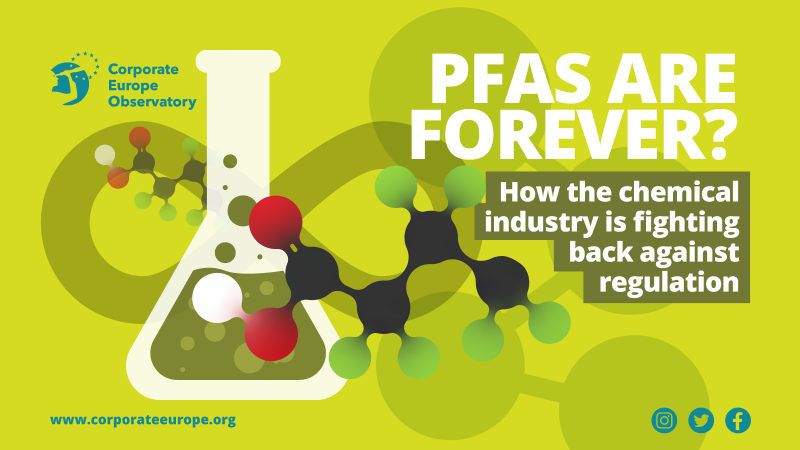The research, using access to documents requests and LobbyFacts data, shows that:
- PFAS polluters and their allies are trying to avoid the PR disaster of being compared to Big Tobacco and Big Oil and the denial tactics deployed by those industries for decades. But PFAS polluters knew about the toxicity of their products for years and did nothing. Now the lobby is using a two-pronged strategy: acknowledge public concern about PFAS pollution, but then demand permanent exemptions in the upcoming uPFAS restriction.
- 13 major PFAS producers and users are spending between €18.6 million and €21.1 million in lobbying the EU institutions per year, on all issues, and between them have 72 lobbyists and 59 European Parliament passes. If even a proportion of this firepower is directed towards the uPFAS proposal, it is formidable. But the total PFAS lobby of producers and industrial users is likely to be much, much larger.
- 11 of these companies reported a €9 million lobby spend, on all issues, in one member state alone, Germany, in the most recent year. Meanwhile a Flemish minister has spoken of the “aggressive” industry lobbying on PFAS, and that “the lobbying machine… has increased enormously”, indicating that this battle is being fought at member state level too.
- The big chemical industry trade associations, CEFIC and PlasticsEurope, have set up bespoke groups to coordinate corporate influencing on the PFAS proposal.
- Lobby consultancy firms are very active on PFAS: each of the top 6 lobby consultancy firms in Brussels have at least 2 members of the biggest PFAS industry lobby among their clients.
- Law firms are also joining the PFAS industry’s fight-back against the proposed restriction, also readying for potential legal fights.
Vicky Cann, Corporate Europe Observatory researcher says:
“PFAS polluters are trying to create the impression that the industry is a reasonable actor which can be relied upon to act in the interests of the public good. But they are also demanding opt-outs from a ban on PFAS – and are being supported by various lobby, PR, and law firms. Chemical companies have known about the risks of polluting PFAS for decades and are responsible for the massive PFAS pollution crisis we are facing, the burden of which is largely falling on communities and the public purse. Commercial interests must not be allowed to pollute public interest decision-making to regulate ‘forever chemicals’. The PFAS ban must be fully comprehensive and put in place as soon as possible.”
125 NGOs via the #BanPFAS coalition demand a ban on all ‘forever chemicals’ in consumer products by 2025 and a complete ban by 2030.
ENDS
For more information or interview requests please contact: Vicky Cann, Corporate Europe Observatory researcher, +44 (0) 7960 988 096, vicky@corporateeurope.org
Notes to the editor:
- The 12 biggest PFAS polluters in the world, accounting for a majority of production are: 3M, AGC, Archroma, ARKEMA, BASF, Bayer, Chemours, Daikin, Dongyue, Honeywell, Merck, and Solvay. This is according to ChemSec’s list. In addition, we added the other members of the 'FluoroProducts and PFAS for Europe' or FPP4EU group, set up by CEFIC: DuPont, ExxonMobil, Gujarat, Synthomer, and Gore. Of these 17 companies, 13 are in the EU lobby transparency register.
- All EU lobby data was checked on 4 July 2023 and is available in this spreadsheet. The figures are all self-declared by the registrants themselves and relate to the most recent year for which they have provided figures. The figures cover all declared lobby spending on all issues for the given period. German lobby register figures were checked on 21 June 2023.
- The EU Chemicals Agency (ECHA) is currently conducting a detailed consultation on the proposal introduced by five countries for an EU-wide universal PFAS (uPFAS) restriction to ban the manufacture, sale, and use of up to 10,000 PFAS. This means a uPFAS restriction could be in place by 2025, but corporate lobbying efforts risk delaying the process.
